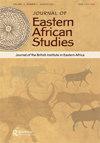推特与政治话语:津巴布韦执政党非洲民族联盟-爱国阵线的支持者如何利用推特进行政治参与
IF 0.6
3区 社会学
Q2 AREA STUDIES
引用次数: 1
摘要
推特等社交网络正在改变当代社会的政治参与。主流文学强调社交媒体在津巴布韦政治格局中提供的反霸权机会。然而,有必要引起学术界对执政党津巴布韦非洲民族联盟-爱国阵线(ZANU-PF)的支持者如何挪用和使用推特进行政治活动的关注。本文以瓦拉卡希(ZANU-PF的社交媒体巨魔和支持者)为例,研究了后罗伯特·穆加贝时代执政党的支持者如何越来越多地占据传统上与反对派声音相关的网络空间。2017年11月推翻穆加贝的政变、2018年7月有争议的选举以及2018年8月平民被枪杀后,总统埃默森·姆南加格瓦的政权一直在努力解决合法性问题。本文以瓦拉卡什的四个推特账号为中心,运用修辞论证的方法来分析这些推特宣传者是如何捍卫和促进姆南加格瓦政权的利益的。调查结果表明,瓦拉卡希正在为2017年11月的政变进行消毒和辩护,在2018年7月的选举中为姆南加格瓦进行竞选,并为2018年8月杀害平民辩护。本文章由计算机程序翻译,如有差异,请以英文原文为准。
Twitter and political discourses: how supporters of Zimbabwe’s ruling ZANU PF party use Twitter for political engagement
ABSTRACT Social networks such as Twitter are transforming political engagements in contemporary societies. Dominant literature places emphasis on the counter-hegemonic opportunities offered by social media in the Zimbabwean political landscape. However, there is a need to draw scholarly attention to how supporters of the ruling party, Zimbabwe African National Union – Patriotic Front (ZANU PF), are appropriating and using Twitter for political engagements. Drawing upon the case of Varakashi (ZANU PF’s social media trolls and supporters), this paper examines how supporters of the ruling party in the post-Robert Mugabe era are increasingly occupying online spaces that were traditionally associated with opposition voices. President Emmerson Mnangagwa’s regime has been grappling with legitimacy issues in the wake of the November 2017 coup that toppled Mugabe, the contested July 2018 election, and the shooting of civilians in August 2018. Focusing on four Twitter handles of Varakashi, this article employs rhetorical argumentation to analyse how these Twitter propagandists are defending and promoting the interests of the Mnangagwa regime. Findings demonstrate that the Varakashi are sanitising and justifying the November 2017 coup, campaigning for Mnangagwa in the July 2018 election, and in justifying the killing of civilians in August 2018.
求助全文
通过发布文献求助,成功后即可免费获取论文全文。
去求助
来源期刊

Journal of Eastern African Studies
AREA STUDIES-
CiteScore
3.30
自引率
7.10%
发文量
12
期刊介绍:
Journal of Eastern African Studies is an international publication of the British Institute in Eastern Africa, published four times each year. It aims to promote fresh scholarly enquiry on the region from within the humanities and the social sciences, and to encourage work that communicates across disciplinary boundaries. It seeks to foster inter-disciplinary analysis, strong comparative perspectives, and research employing the most significant theoretical or methodological approaches for the region.
 求助内容:
求助内容: 应助结果提醒方式:
应助结果提醒方式:


